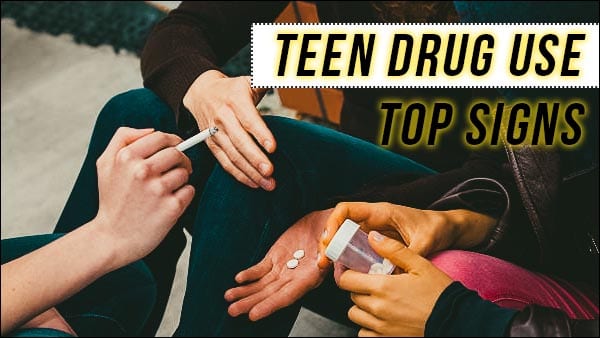Teen drug use and overdoses have been on a steady rise since 1999. Although drug use among teens is trending downward, some figures suggest teen drug overdoses rose 19% between 2014 and 2015.
The threat of drug use is no joke, especially when it comes to teenagers and young adults. The biggest threat remains opioids, though other drugs like methamphetamine are increasingly popular.
Unfortunately, it can be difficult to recognize drug abuse in anyone. Teens can be especially secretive about their behaviors.
Are you concerned your teenager is abusing drugs? How can you tell? Here are some signs of teen drug use you can look for.
1. Dramatic Shifts in Personality
Everyone has a different personality and different patterns of behavior. As a parent, you should have a good grasp on how your child behaves on a regular basis. However, you may begin to notice strange shifts in mood and behavior.
For example, you might notice your teenager retreating into a shell or going out much more.
This can be a natural part of growing up. Teenagers are often moody and unwilling to talk to their parents. Personality shifts are a normal part of development.
What might be concerning is if these changes come suddenly. If the change is a result of drug use, the shift might seem sudden or even forced.
2. Problems With Hygiene and Appearance
Some drug addictions may lead to neglect of personal well-being. Your child may fail to keep up with their personal hygiene. You may notice an unusual body odor or bad breath.
They may also begin to care less about their appearance, wearing the same clothes over and over again. This should be of concern because teens often put a great deal of thought into their overall appearance.
3. Changes in School Performance
Drug use will typically come with poor academic performance. Fixation on drugs can lead to lack of attention in the classroom.
You may notice a sudden drop in grades, especially if your child was previously a good student.
Not all drugs will lead to poor academic performance, though. Some drugs, like Ritalin and Adderall, may actually increase classroom performance.
Use of these drugs, though, should be an area of concern. They could lead to dependency or other harder drugs, such as methamphetamine.
4. Sudden Need for Money or Stealing
Drugs can be expensive. Unless your teenager has a job, they may begin coming to you for money unexpectedly. This may not be too concerning if you normally provide your teenager with funds.
What may be concerning is if they start asking for money more frequently.
People with drug dependencies and addictions may start stealing from friends and family. If you suddenly notice cash or valuables missing, you may have a reason for concern.
These behaviors may seem out of character for your child.
5. Physical Signs
Drug use can have physical symptoms, especially if it’s been going on for a while. Some drugs like marijuana may produce only subtle symptoms like red eyes and sluggishness.
Other drugs may produce more dramatic symptoms over long periods of time. You may notice sudden and dramatic weight loss, chronic fatigue, seizures, vomiting, bruises, and sweatiness.
IV drugs like heroin and methamphetamine may produce track marks. These are the marks left behind at the injection sites.
Track marks are a tell-tale sign of IV drug use.
Some prescription drugs can lead to attention deficits and lapses in memory. If you notice your teen is abnormally forgetful, it could be a reason for concern.
6. Changes in Friend Groups
Friends have a huge influence on teenagers’ lives. While you may want your child to hang out with friends after school and on the weekends, the quality of friends counts.
Have you noticed a change in the types of people your teenager hangs out with? This could a potential area of concern.
Teens can change friend groups in search of acceptance. However, this may be a problem if the new friends pressure your teenager into using illicit drugs.
Should You Search Their Room?
One thing you might consider is searching through your teenager’s room. However, you don’t want to violate your child’s trust and destroy your relationship. This can be a difficult area to navigate.
Should you search their room?
If you have reason to suspect your teenager is using an illicit drug of any sort, even alcohol, you may need to do a search.
Teenagers can get creative when hiding drug paraphernalia and alcohol. Try to be as thorough as possible. Look in drawers, in plants, under the bed, in bags, and everywhere.
Be Prepared to Explain
Your teenager may get very upset if they find out you’ve been going through their room. You need to have an explanation on hand, especially if you don’t find anything.
If you don’t find anything, your child will be very upset.
Try Talking First
Your first step should always involve an honest conversation. If your child is hiding something, you may be able to pick up on the lies.
Having a conversation, though, will prove you won’t go behind their back to search without a warrant.
The Next Steps for Teen Drug Use
Many teenagers will experiment with drugs and alcohol. Experimentation doesn’t always precipitate chronic drug use and addiction.
Experimentation may be the result of peer pressure, emotional issues, or simple curiosity.
If you think experimentation has crossed the line into addiction, you may need to seek professional help. Luckily there are plenty of effective teen drug rehabilitation programs available.





